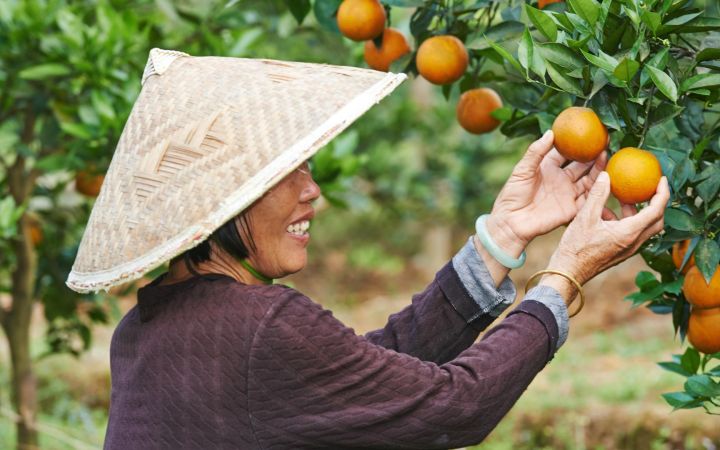23 June 2020, Rome/Brussels – If we want to shift towards healthy and sustainable food systems and build back better after the COVID-19 pandemic, we need to re-connect agriculture with ecosystem services and unleash biodiversity’s full potential to enhance our food and agriculture production, the participants of a high-level panel discussion, co-organised by FAO and the European Union, heard today.
The virtual discussion entitled “The European Green Deal: A Conversation on the Transformative Force of the EU Farm to Fork and Biodiversity Strategies to build Healthy and Sustainable Food Systems” focused on ways to strengthen the FAO-EU collaboration on addressing challenges to sustainably manage biodiversity across all agricultural sectors.
“Biodiversity is vital to improving agricultural and food production and maintaining our planet’s resources and ecosystems,” said FAO Director-General QU Dongyu, calling for more to be done to prevent the biodiversity loss undermining the resilience of many agricultural systems and posing a serious threat to global food security.
However, in his opening remarks Qu noted that achieving sustainability at a global scale requires more than just technical and digital solutions. “It involves key policy decisions, and in this regard the EU just made a big step,” the FAO Director-General said referring to the recently adopted European Green Deal.
To this end, he noted that the implementation of these important decisions in the field requires strong collaborative efforts between environment and agriculture sectors.
“We are ready to work together with the environment sector; to accompany the changes across the entire food system, from production to consumption,” Qu concluded.
In late 2019, the European Commission adopted the European Green Deal, a broad roadmap to develop Europe’s circular economy, fight climate change, and preserve biodiversity, oceans and forests.
In describing the initiative, Commission President Ursula von der Leyen said in this regard: “Making nature healthy again is key to our physical and mental wellbeing and is an ally in the fight against climate change and disease outbreaks. It is at the heart of our growth strategy, the European Green Deal, and is part of a European recovery that gives more back to the planet than it takes away.”
In his opening remarks during today’s panel discussion, Jan Tombinski, EU Permanent Representative to the UN Rome Based Agencies, referred to the two key pillars of the European Green Deal, the Farm to Fork and Biodiversity strategies. Both, he noted, promote an integrated approach that reflects the real value of nature and services that ecosystems provide to us. particularly in relation to agriculture and food security.
Today’s discussion also saw the participation of Sabine Juelicher, Director Food and Feed Safety, Directorate-General for Health and Food Safety, European Commission; John Clarke, Director, International Relations, Directorate-General for Agriculture, European Commission; Humberto Delgado Rosa, Director Natural Capital, Directorate-General for Environment, European Commission; Carla Montesi, Director Planet and Prosperity, Directorate-General for International Cooperation and Development, European Commission; and Maria-Helena Semedo, Deputy Director General, FAO.
FAO-EU collaboration to mainstream biodiversity into agricultural sectors
Since 1991, the EU and FAO have collaborated through a substantial number of programmes in Africa, Asia, Europe, the Near East and Latin America. Between 2016 and 2019, the EU contributed more than USD 932 million to projects and programmes implemented by FAO.
Thanks to the EU funding, FAO is currently supporting projects on the elimination of obsolete pesticide stockpiles and capacity development for improved pesticide management in Africa, for example.
On forests, in the UN-REDD Programme, of which the EU is a founding member, FAO has supported more than sixty countries to halt deforestation, and while simultaneously addressing climate change, the preservation of biodiversity and safeguarding livelihoods.
The Sustainable Wildlife Management (SWM) Programme, implemented by FAO and partners and founded by the EU in 13 countries aims to address both wildlife conservation and food security.
The European Union also provided financial support to complement and strengthen the One Health approach, building on the existing Sustainable Wildlife Management Programme. The objective of this project will be to increase the understanding and assessment of the zoonotic risks along wild meat supply chains – from the forest to both rural and urban consumers. It will also assist countries to build their capacities to predict zoonotic risks and to set up measures to prevent and mitigate those risks and their consequences on public health, food systems and biodiversity.
FAO’s work on biodiversity
In recent years, FAO has made significant progress on integrating biodiversity in all agricultural policies.
Last year, it launched its flagship report on the State of the World’s Biodiversity for Food and Agriculture. The report highlights the need to protect natural resources, including biodiversity, and the need to conserve and use genetic resources to increase productivity.
The Organization also adopted its Strategy on Mainstreaming Biodiversity across Agricultural Sectors, which aims to reduce the negative impacts of agricultural practices on biodiversity, to promote sustainable agricultural practices and to conserve, enhance, preserve and restore biodiversity as a whole.
In addition, FAO developed a range of biodiversity related tools and guidance across sectors, including an International Code of Conduct for the Sustainable Use and Management of Fertilizers and the Ten Elements of Agroecology.








